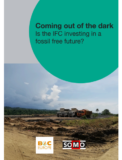The International Finance Corporation (IFC), the private sector arm of the World Bank, should do more to fight the threat of climate change by reducing its lending to fossil fuel projects. The report “Coming out of the dark: Is the IFC investing in a fossil free future?” shows that IFC has taken some steps to reduce its support for coal projects. However, too many loopholes and risky investments remain.
With a mandate to encourage private-sector development in developing countries, the IFC is a major investor and lender – with a portfolio worth $57 billion – and also a standard-setter for other financial institutions. In the last decade, the IFC’s “hands-off” approach to lending through third-party financial intermediaries (FIs) – such as commercial banks or private equity funds – embroiled the IFC in several scandals, linking the IFC to environmental destruction and human rights abuses, many of which related to coal projects, from Honduras to the Philippines.
This new report by Bank Information Center Europe (BIC Europe) and the Centre for Research on Multinational Corporations (SOMO) exposes loopholes through which the IFC still supports coal projects, shortcomings in the IFC’s disclosures on coal, and missed opportunities for the IFC to reduce its support of fossil fuels generally.
IFC’s positive steps
The report confirms that the IFC is genuinely changing its lending approach. The IFC is increasingly targeting investments towards end uses less likely to be linked to coal, such as small- and medium-sized enterprises or women’s economic empowerment. In a small number of FI investments, the IFC has explicitly excluded coal and other projects that cause significant harm to indigenous people and biodiversity.
Still too many problems
But the report also finds that problems remain. The IFC has not eliminated all general (as opposed to targeted) lending and investment, and some of its efforts to target loans are “leaky,” allowing cracks through which funding can end up supporting coal projects. The report highlights the serious human and environmental costs that result from two IFC FI investments, in a coal plant in India and a cement plant and open cast coal mine in Myanmar.
Critically, the IFC is not taking the lead in addressing climate change more broadly, by excluding funding for oil, gas, and other fossil fuel investments by FI clients. Civil society has been clear that the IFC must do more to clean up its act and set an example for others.
Kate Geary, Co-Director of BIC Europe, says: “While the IFC’s new commitments represent a positive step, it is not nearly enough to address the problem. IFC must send a signal that there is no future in fossil fuels.”




